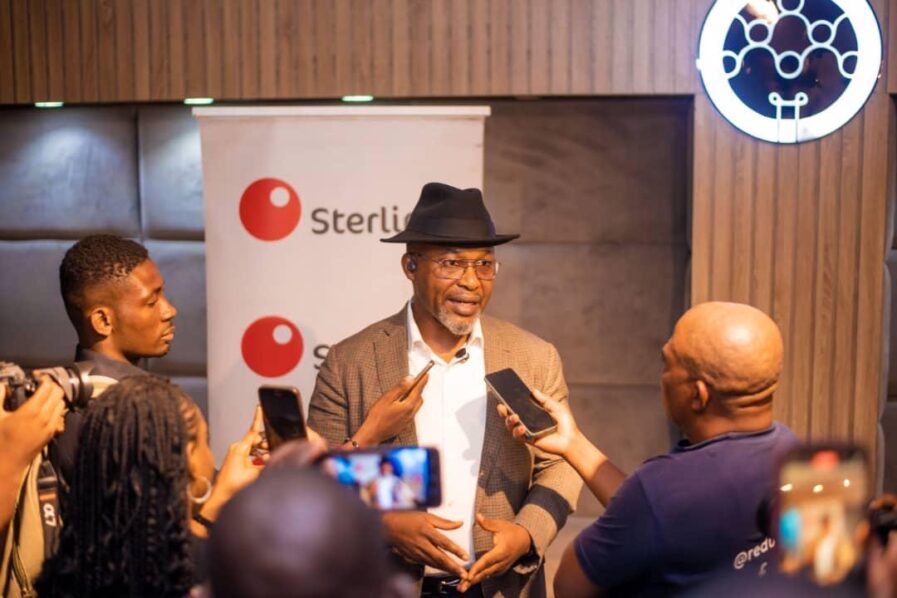
A former Minister of Aviation, Osita Chidoka, has publicly thrown his weight behind Sterling Bank’s decision to eliminate charges on local online transfers by opening a personal account with the bank in Abuja.
What began as a social media pledge turned into a symbolic protest on Friday when Chidoka walked into Sterling Bank’s regional headquarters to register his support for what he described as “a bold and ethical intervention in Nigeria’s exploitative banking landscape.”
Chidoka’s action follows Sterling Bank’s recent announcement scrapping all local transfer fees on its OneBank platform—an unprecedented move among Nigeria’s major financial institutions. The announcement, made on April 1st, was initially met with scepticism by Nigerians who suspected it was an April Fool’s prank. The bank, however, clarified that the policy was genuine and had taken effect immediately.
Sterling Bank scraps transfer charges, challenges industry norms https://t.co/fRu6CeuZlZ
— The Guardian Nigeria (@GuardianNigeria) April 2, 2025
Sterling’s decision, which could see it forgo billions of naira in annual transfer revenue, has been widely lauded by customers as a welcome relief in a period of rising living costs. For Chidoka, the bank’s gesture marks a new chapter in customer-centred banking.
“Sterling Bank did the math—and still chose the people,” he posted earlier in the week. “They gave up billions in transfer charges just to give Nigerians breathing room.”
READ MORE: Sterling Bank scraps transfer charges, challenges industry norms
Chidoka, a long-time critic of banking fees, said his decision to open an account at the bank was a personal protest and a “statement of values” on behalf of the average Nigerian. He commended Sterling Bank’s leadership for breaking ranks with an industry that continues to generate record profits while imposing what he called “quiet extractions” from everyday citizens.
Zero Cost. Full Value.
As promised, I entered @Sterling_Bankng today to open an account and start a national conversation.
Flanked by young Nigerians and joined by former Governor Okezie Ikpeazụ, we made a statement beyond account opening.
Zero-cost banking is a quiet… pic.twitter.com/qUBa8hUfpJ
— Osita Chidoka (@osita_chidoka) April 4, 2025
Speaking during the visit, Chidoka noted that despite digitisation, banks still charge customers between ₦10 and ₦50 per transfer—fees that accumulate across millions of transactions daily.
“Nigerian banks post huge profits year after year, yet continue to burden their customers with fees that cost next to nothing to process,” he said. “Sterling has now done what others refused to do: they walked away from billions to stand with the people. That is what ethical banking looks like.”
He drew parallels with the transformation of the telecoms sector through per-second billing—once considered commercially unviable but later a game-changer for consumers—and argued that a similar shift is now possible in Nigerian banking.
“If four of Nigeria’s biggest banks earned ₦186 billion last year from transfer charges alone, then removing those fees won’t break them. But it might just uplift millions.”
Chidoka recalled how his 2023 campaign against transfer charges received little attention, but praised Sterling Bank for taking initiative without regulatory pressure. “They didn’t wait for the law,” he said. “They led by conscience.”
Former Governor of Abia State, Dr Okezie Ikpeazụ joined me and numerous young people to open an account with @SterlingBank to endorse and support their Zero Transfer charges.
Like @glonigeria, which led the way in per-second billing, Sterling Bank is leading the charge for… pic.twitter.com/JcnPgd8D9z
— Osita Chidoka (@osita_chidoka) April 4, 2025
The visit, which lit up social media, has galvanised public support. Many Nigerians are now calling for every Friday to be marked as “#OpenSterlingAcctDay,” urging citizens to back financial institutions that prioritise customer welfare.
With prominent figures signalling their intention to follow Chidoka’s lead, pressure is mounting on other banks to reconsider their fee structures and adopt more transparent, consumer-friendly policies.
“In a digital economy, money should move freely,” Chidoka declared. “Every naira lost to needless charges is a naira taken from food, school fees, or small business capital. If we want better banking, we must reward better banks. Let us vote with our wallets.”
In a period where rising inflation and economic hardship have left many Nigerians disillusioned with public and private institutions, Sterling Bank’s move has sparked a fresh conversation about fairness, responsibility, and the true cost of banking. Whether other banks will follow remains uncertain. But as Chidoka noted, “Nigerians now have a choice—and a bank that chose them first.”






